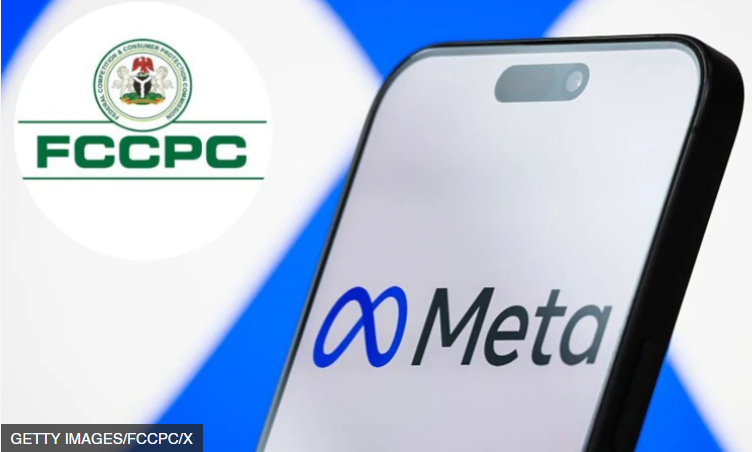It’s no longer news that Meta Platforms, the parent company of WhatsApp, Facebook, and Instagram, is having the burden of a $220million fine hanging on its shoulders. The humongous fine was slammed on the tech behemoth over discriminatory data practices against Nigerian users at the Federal Competition and Consumer Protection Commission (FCCPC) Tribunal.
So far, the three-member tribunal panel led by Thomas Okosun, which reviewed the FCCPC ruling, has not only reaffirmed the fine but has also ordered the tech giant to reimburse the commission the sum of $35,000, being the cost of the investigation into the alleged abuses.
Coming less than three months after the commission secured its landmark legal victory against MTN Nigeria, following the Federal High Court, Lagos’s reaffirmation of its authority to regulate competition and consumer protection across all sectors, including telecommunications, the decisions on the two cases have come to reinforce the importance of the FCCPC in consumer protection and competition matters.
A shareholder in MTN Nigeria, and a legal practitioner, Emeka Nnubia, had dragged the commission to court over its power on telecom matters.
But the court disagreed with his view, saying that Section 90 of the Nigerian Communications Act (NCA) 2003, which grants the NCC jurisdiction over competition matters in the telecom industry, cannot be taken in isolation from Section 104 of the FCCPC Act (FCCPA) 2018. Being a more recent law, that, supersedes any conflicting provisions in the NCA 2003. This means both the FCCPC and NCC share concurrent authority, allowing for a coordinated regulatory approach that prioritises fair competition and consumer protection in the telecoms sector.
Furthermore, the court reinforced Section 105 of the FCCPA 2018, which mandates collaboration between FCCPC and sector regulators, including the NCC; it said this aligns with global best practices, which allow consumer protection agencies to work alongside industry-specific regulators for comprehensive oversight.
Additionally, the court said that the FCCPC does not need to enter into a Memorandum of Understanding (MoU) with sector regulators before carrying out its own statutory functions, but rather, it is the obligation of sector regulators to engage with FCCPC to define how they are to collaborate.
ALSO READ: FCCPC imposes monetary penalty of $220M on Meta
The ruling said the FCCPC had the power to issue a Summons and Request to Produce to MTN Nigeria as part of its ongoing investigation into potential anti-competitive practices, and finally that the FCCPC’s actions were lawful and did not violate any data protection laws, as no personal data was requested.
This was a landmark judgment that was enough to send the appropriate message to any institution about the extent or limits of the FCCPC’s powers.
But it would seem Meta Platforms did not take adequate cognisance of this ruling; otherwise, it would have guided it in its own case against the FCCPC. Although it may be argued that the Meta matter had come up long before the court judgment on the question of the commission’s powers, it still tells us that many institutions, including giants in the land, were either truly oblivious that the commission had such enormous powers or Meta just decided to try its luck for some different result.
Ondaje Ijagwu, the FCCPC director for corporate affairs, who imposed the fine,
said, “The tribunal resolved Issues 1 to 7 largely in favour of the FCCPC, dismissing the appellants’ objections to the commission’s findings, orders, and legal competence.
“One of the central issues (Issue 3), which alleged a breach of fair hearing, was decided in favour of the commission, with the tribunal affirming that the FCCPC fully discharged its quasi-judicial responsibilities by affording the appellants ample opportunity to respond. The tribunal found no violation of constitutional due process.’’
As a matter of fact, the tribunal pointed out that Meta’s privacy laws were in conflict with Nigerian law, among others.
Many organisations and individuals who had known next-to-nothing about the commission would now be waking up to the reality, not just of its existence but also its raison d’être. Indeed, it is good that these giants are the ones involved in the infractions. If they could get the comeuppance that they got, then lesser organisations should know they have no hiding place if they get on the wrong side of the law, bothering on consumer protection.
But Nigeria would not be the first place where Meta Platforms would be fined such a huge amount. The European Commission had cause to fine Meta €797.72 million as recently as last year, for breaching EU antitrust rules.
Hear Margrethe Vestager, the EU’s Executive Vice-President in charge of competition policy, on the fine: ‘’Today we fine Meta €797.72 million for abusing its dominant positions in the markets for personal social network services and online display advertising on social media platforms. Meta tied its online classified ads service, Facebook Marketplace, to its social network, Facebook and imposed unfair trading conditions on other online classified ads service providers. It did so to benefit its service, Facebook Marketplace, thereby giving it advantages that other online classified ads service providers could not match. This is illegal under EU antitrust rules. Meta must now stop this behaviour.’’
Before this, specifically in May 2023, Meta was fined a record 1.2 billion euros ($1.3 billion) and ordered to stop transferring data collected from Facebook users in Europe to the United States, in a major ruling against the social media company for violating European Union data protection rules.
So, the fines are usually hefty; it’s not only about Nigeria, because Meta is also a heavy revenue spinner. A company that wants to operate in another country must be ready to abide by the laws of the host country instead of wanting to impose its laws on others.
Therefore, rather than worry about the ‘huge’ fine, we should worry about how it would be spent in case Meta appealed and lost.
Of course, as in the Nigerian experience, Meta has always defended its actions. It, for instance, described the EU punishment thus: “This isn’t just about a fine,” said Meta’s Chief Global Affairs Officer Joel Kaplan. “The commission forcing us to change our business model effectively imposes a multi-billion-dollar tariff on Meta while requiring us to offer an inferior service.”
If all of these are happening in countries that are well structured, some with their anti-trust laws, we can only pity the consumer in Nigeria that has been robbed of his own crown a long time ago and is, in fact, still existing at the mercy of all manner of producers. From telecommunication to banking, digital broadcasting, air travel, products and services in virtually all sectors, Nigerian consumers face daily exploitation. What makes it very disturbing is the fact that it appears as if the practice has an official stamp on it, despite complaints from the exploited consumers.
But the government is not unaware of this. That was what informed its setting up of regulatory agencies in every sector. Thus we have
But more often than not, their effects are hardly felt, sometimes due to corruption and often because they cannot carry out their onerous responsibilities.
For instance, no matter how determined NERC Forum is, it cannot handle 30 per cent of the complaints in the power sector for the simple fact that most of the players there are too steeped in iniquities or unfair practices to repent. The result is that the forum is overwhelmed. The same applies to the telecoms and other sectors.
This is where the intervention of an organisation like the FCCPC is important.
Mercifully, the commission now has a tested technocrat with the will to succeed at the helm.
It is often said that a tree cannot make a forest. In other words, a single individual might not be able to single-handedly turn things around in an establishment. But an individual with focus, determination and the requisite idea showing the way can make a lot of difference. We have that in Ishaq Oloyede, who has opened our eyes to the fact that the Joint Admissions and Matriculation Board (JAMB) that he heads is not the desert that we thought it was before he got there. Today, the Federal Government smiles to the bank every year, with the billions remitted by Oloyede’s JAMB.
Since July last year, when Bello came on board as executive vice chairman/ chief executive officer, he has similarly been trying to reposition the FCCPC that many people and institutions should know like the lines on their palms, but do not know. If ever they knew, we would not be having giants like MTN and Meta Platforms seeing it as a meddlesome interloper in a matter that it has primary jurisdiction.
True, the two major cases recently resolved in the commission’s favour predate Bello’s appointment. But then, the commission continued to pursue them to the very end symbolising his commitment to the cause of ensuring fair competition and consumer protection.
The matters were concluded in his time because he supported the cause. We have had many instances where similar matters were surreptitiously swept under the carpet by some bosses in his shoes. We have had instances where even when such matters had already opened in court, the people expected to bring them to conclusion entered “nolle prosecui”. And that would be the end of the story. This is especially so with mega establishments like MTN and Meta Platforms that have the money to fight or play with.
Not only has Bello supported the cases since his assumption of duties, he has also held workshops, road shows, etc. to publicise the commission’s activities, enlighten both producers and consumers on their rights and privileges as well as register the FCCPC in the consciousness of Nigerians.
But there is still room for improvement. Consumers should be encouraged to continue reporting instances of poor service delivery or exploitative practices through the FCCPC’s official channels. But these channels should be well publicised for effectiveness.
Nigerian consumers have since lost their crown. The way things are, they do not even have caps on their heads. Ask electricity consumers without meters; they will tell you the DisCos do not respect any such caps on billing issued by the regulatory agency!
There is no doubt that a well-funded and equipped FCCPC will facilitate result that would gladden the hearts of Nigeria’s hapless consumers who are perpetually in the firm grips of shylocks who behave like pigs that you can hardly differentiate the first from the last born, as they all play in the mud.
In conclusion, the FCCPC’s teams responsible for these victories and for diligently prosecuting the cases deserve commendation from all well meaning Nigerians.






Comment
No comments found.